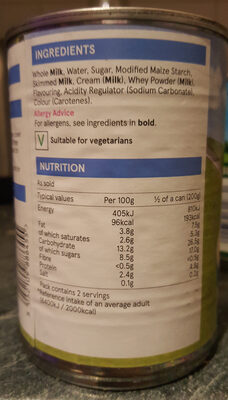
Barcode: 5052109886455
Custard
HALAL
📝 Reason: The product ‘Custard’ is considered Halal as it does not contain any Haram ingredients or E-codes. All ingredients are either derived from permissible sources or are inherently permissible in Islam. The flavouring ingredient is marked as doubtful due to unspecified source, but it does not affect the overall Halal status of the product.
🏷️ Category: Dairies, Desserts, Dairy Desserts, Creamy Puddings, Canned Creamy Puddings
📄 Certificates: Vegetarian, Vegetarisch
Ingredients:
Details
Understanding the Halal Status of Custard
The product ‘Custard’ is marked as Halal, which means it complies with Islamic dietary laws. In this article, we will delve into the ingredients that make up this creamy dessert and discuss their Halal status in detail.
Ingredients of Custard
Custard is a delightful dessert that consists of the following ingredients:
- Whole milk
- Water
- Sugar
- Modified maize starch
- Skimmed milk
- Cream (milk)
- Whey powder (milk)
- Flavouring
- Sodium carbonate (E500)
- Carotenes (E160a)
Detailed Ingredient Analysis
We will now examine each of the ingredients and their respective status, ensuring we clarify the reasons behind the Halal certification.
Whole Milk
Whole milk is derived from cows, making it permissible according to Islamic dietary laws. This ingredient is fundamental to custard, providing the creamy texture.
Water
Water is universally considered permissible in Islam. It is essential in custard for the mixing process, contributing to its consistency.
Sugar
Sugar, a common ingredient in many desserts, is also Halal. It does not have any components derived from Haram sources.
Modified Maize Starch
This starch comes from maize, a plant, and is deemed permissible in Islam. It acts as a thickening agent in the custard, ensuring a smooth and creamy final product.
Skimmed Milk
Skimmed milk is another dairy product derived from cows and thus, is also compliant with Halal standards. It contributes to the creamy texture while reducing fat content.
Cream (Milk)
The cream used in this custard is derived from milk, making it permissible as well. It enriches the flavor and contributes to the dessert’s profile.
Whey Powder (Milk)
Whey powder is a byproduct of cheese production and is also derived from milk. It is permissible in Islam and enhances the nutritional content of custard.
Flavouring
The flavouring in the custard is marked as doubtful due to its unspecified source. While this component is common in many products, it raises questions about its Halal status. However, this uncertainty does not adversely affect the overall certification of the product.
Sodium Carbonate (E500)
Sodium carbonate is an antacid and is permitted in Islam. It helps adjust the acidity levels, contributing to the flavor and stability of the custard.
Carotenes (E160a)
Carotenes, derived from plants, are permissible in Islam as well. This ingredient provides a natural color to custard, making it visually appealing.
The Verdict: Custard’s Halal Certification
The overall composition of custard showcases a careful selection of ingredients, most of which are derived directly from permissible sources. With the majority being clearly Halal and only one ingredient raising potential doubt, we can confidently assert that Custard is Halal. The product also holds a Vegetarian and Vegetarisch certificate, further attesting to its compliance with dietary restrictions.
Conclusion
If you’re enjoying custard, you can do so with confidence in its Halal status. The meticulous screening of its ingredients underscores its suitability for those adhering to Islamic dietary laws. Always check labels for updates, especially regarding flavourings, to ensure continued compliance.

